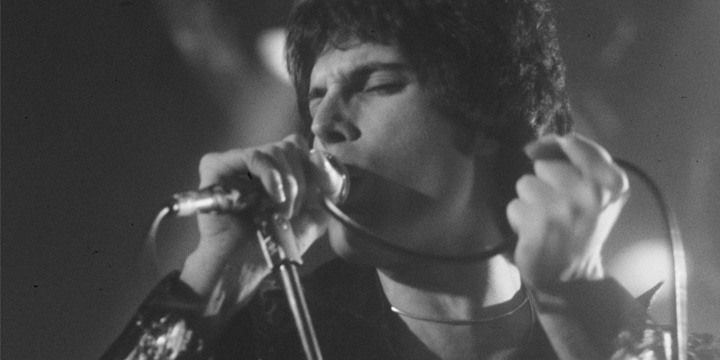Science has officially confirmed what we already knew about Freddie Mercury: he had an unequivocally great singing voice, particularly for a rock vocalist. Swedish, Austrian, and Czech researchers took a deeper, more scholarly look at the singer’s voice to come to some empirically-based conclusions.
Published in Logopedics Phoniatrics Vocology this past Friday, the study “Freddie Mercury—acoustic analysis of speaking fundamental frequency, vibrato, and subharmonics,” conducted by Christian T. Herbst, Stellan Hertegard, professional rock singer and vocal coach Daniel Zangger-Borch, and Per-Åke Lindestad, dug into what made Mercury’s voice so unique and made quite a few interesting insights.
First and foremost, it’s likely that, although he was known primarily as a tenor, Mercury was actually a baritone. Based on speech taken from six interviews conducted in the ‘80s, the team discovered the median fundamental frequency at which Mercury spoke was 117.3 Hz. This frequency suggests a baritone singing voice.
There’s some anecdotal corroboration to the team’s findings in a quote from classical soprano Montserrat Caballé, who once said, “He had a baritone voice. I told him one day, ‘Let’s do a small duet of baritone and soprano,’ and he said, ‘No, no, my fans only know me as a rock singer and they will not recognize my voice if I sing in baritone.’”
Mercury died in 1991, so the researchers looked at Zangger-Borch’s vocal chords while he was imitating the famous Queen singer to draw conclusions regarding the way Mercury’s vocal chords functioned.
Filming Zangger-Borch’s vocal chords at 4,000 frames per second, the team got a good look at how Mercury likely sang. With this method, they discovered that Mercury actually utilized subharmonics, which was and still is rare for rock singers. Subharmonics are generated when the ventricular folds in your throat vibrate along the vocal folds, and are typically associated with Tuvan throat singers.
Not only that, but an analysis of his vibrato determined that his vocal chords simply vibrated faster than others. Mercury’s vibrato moved at a whopping 7.04 Hz, whereas the typical Western classical singer has a vibrato somewhere in the range of 5.4 Hz to 6.9 Hz — and this is just for classical singing.
The ultimate vibrato would be that of a perfect sine wave, at the value 1, which opera singer Luciano Pavarotti very nearly hit. Mercury’s vibrato waves had a value of 0.57, indicating his vocal chords were modulating at more than one frequency. This means he sang with an irregular, and therefore highly unique, vibrato.
It’s always been hard to deny that Freddie Mercury was one of the most iconic rock vocalists of all time, and it’s even harder now with scientific data showing us just how beautifully uncommon his voice was.
Originally posted on REVERB.COM


